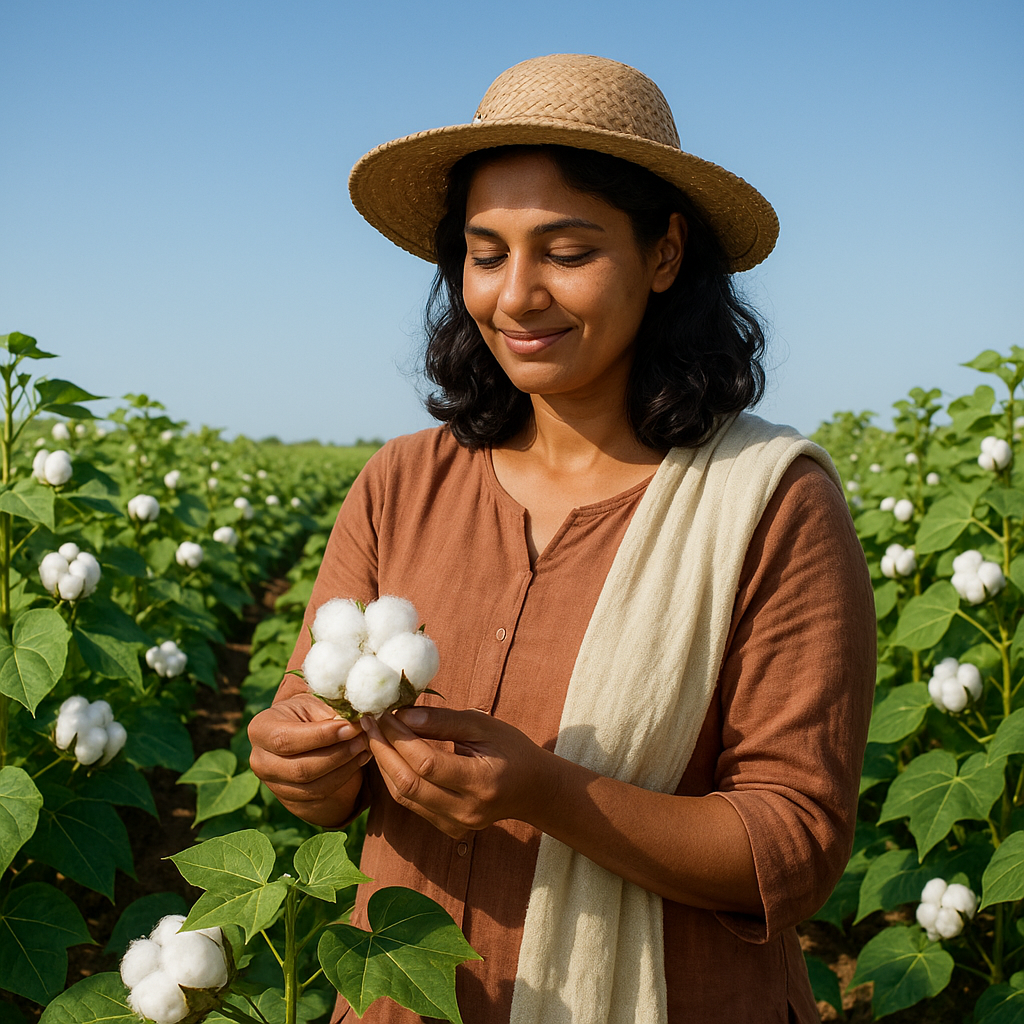10 Reasons to Switch to Organic Cotton and Eco Accessories Today
Conventional cotton production comes with a heavy price tag for our planet. Using 16% of the world's insecticides and 7% of all pesticides, traditional cotton farming depletes soil health, pollutes waterways, and exposes farmers to harmful chemicals. As environmental concerns grow, more people are seeking what true sustainability means in their everyday purchases. Organic cotton and eco accessories offer a genuine alternative that benefits your health, the environment, and the people involved in production.
What Makes Organic Cotton and Eco Accessories Different?
Organic cotton isn't just marketing—it's defined by strict standards. True organic cotton is grown without synthetic pesticides, GMO seeds, or artificial fertilizers. The Global Organic Textile Standard (GOTS) certification ensures the entire production chain meets environmental and social criteria, from field to finished product.
Unlike conventional "100% cotton" that may still contain residual chemicals from farming and processing, organic cotton undergoes rigorous testing to verify its purity. Similarly, eco accessories go beyond just using sustainable materials—they consider the entire lifecycle impact from production methods to end-of-life recyclability.
What's critical to understand is that not all natural fabrics are created equal. Certification matters because it provides third-party verification of claims. Our new organic cotton T-shirt demonstrates how premium organic materials can be transformed into everyday essentials without compromising quality or ethics.
10 Reasons to Switch Today
The market for organic textiles and accessories has expanded dramatically, making now the perfect time to make the switch. Better accessibility, competitive pricing, and increased consumer awareness have created a tipping point for sustainable products.
1. Healthier for Your Skin and Body
Organic cotton is naturally hypoallergenic, making it ideal for sensitive skin. Without the residual pesticides found in conventional cotton, it significantly reduces the risk of skin irritation, rashes, and allergic reactions. This chemical-free composition is especially important for those with eczema, dermatitis, or other skin sensitivities.
The absence of harsh processing agents also means you're not absorbing potentially harmful substances through your skin—your body's largest organ.
When fabrics touch your skin all day, the purity of those materials matters tremendously for your overall health and comfort.
2. Environmental Impact: Less Water, Fewer Chemicals
Organic cotton farming uses 91% less water than conventional methods, a crucial advantage in our water-stressed world. This dramatic reduction comes from healthier soil that retains moisture better and farming practices that prioritize natural irrigation.
The elimination of synthetic pesticides and fertilizers means waterways near cotton fields remain cleaner, protecting aquatic ecosystems and drinking water sources. Soil degradation—a major problem with conventional cotton—is reversed through organic practices that build rather than deplete fertility.
By choosing organic cotton, you're directly supporting agricultural methods that heal rather than harm our planet's natural resources.
3. Better for Farmers and Workers
The human cost of conventional cotton production is often overlooked. Farmers and field workers in traditional cotton production face daily exposure to toxic chemicals, leading to serious health issues ranging from respiratory problems to neurological damage.
Organic cotton farming eliminates these hazards while often incorporating fair trade principles that ensure better wages and working conditions. Many organic cotton cooperatives provide additional benefits like healthcare, education support, and community development programs.
Supporting this ethical approach to production means standing for human dignity throughout the supply chain—from the field to the factory.
4. Superior Durability and Longevity
Contrary to some misconceptions, organic cotton products typically outlast their conventional counterparts. The absence of harsh chemicals during processing preserves the natural strength of cotton fibers, resulting in fabrics that maintain their integrity through repeated washing and wear.
This durability translates to better value over time. While the initial purchase price might be slightly higher, the extended lifespan of organic cotton items means fewer replacements and less waste. From bedsheets to t-shirts, investing in quality organic pieces pays dividends in longevity.
5. Softness and Comfort
The natural processing of organic cotton preserves its inherent softness, creating exceptionally comfortable fabrics. Without chemical treatments that can leave fibers brittle, organic cotton maintains its plush feel wash after wash.
This natural material also offers superior breathability compared to synthetic alternatives or chemically-treated cotton. The result is better temperature regulation—keeping you cooler in summer and warmer in winter. For items in direct contact with your skin like undergarments, bedding, and everyday wear, this enhanced comfort makes a noticeable difference.
6. Vegan and Cruelty-Free
Ethical shoppers concerned about animal welfare can feel confident choosing organic cotton. As a plant-based material, it offers a cruelty-free alternative to animal-derived textiles like wool, silk, or leather.
The eco accessories market has expanded to include innovative vegan alternatives to traditional materials—from pineapple leaf "leather" to recycled plastic accessories. These products maintain high performance standards while aligning with compassionate consumer values.
By supporting brands that avoid animal testing and animal-derived ingredients in their processing methods, shoppers can ensure their entire wardrobe and accessory collection reflects their ethical commitments.
7. Supports Sustainable, Transparent Supply Chains
The organic cotton industry has pioneered traceability in textile production. Leading brands provide detailed information about where their cotton is grown, who processes it, and how it reaches the consumer—information that's rarely available with conventional products.
This transparency creates accountability throughout the production chain. GOTS certification requires ongoing compliance and documentation, giving consumers confidence that their purchases meet strict environmental and social standards.
Supporting this system encourages conventional manufacturers to adopt similar practices, gradually shifting the entire industry toward greater responsibility and openness.
8. Promotes Biodiversity and Soil Health
Organic cotton farming embraces biodiversity through practices like crop rotation, companion planting, and natural pest management. These techniques create agricultural ecosystems where beneficial insects thrive and soil microorganisms flourish.
Healthy soil is perhaps the most valuable yet overlooked benefit of organic agriculture. By avoiding synthetic inputs and employing regenerative practices, organic cotton fields become carbon sinks rather than carbon sources, helping mitigate climate change while producing healthier crops.
The biodiversity supported by organic farming extends beyond field boundaries, providing habitat for wildlife and creating agricultural landscapes that work with—rather than against—natural systems.
9. Stylish, Contemporary Eco Accessories Available
Gone are the days when eco-friendly meant compromising on style. Today's sustainable accessories include everything from sleek phone cases to fashionable bags, contemporary bedding to performance activewear. Designers are proving that aesthetics and ethics can coexist beautifully.
Innovation in sustainable materials has exploded, with options like organic cotton blends, recycled polyester, and plant-based alternatives offering the performance and visual appeal consumers demand. Our premium organic cotton tote demonstrates how functional design and sustainability can seamlessly integrate.
This evolution means you no longer need to choose between looking good and doing good—you can confidently achieve both with today's eco accessories.
10. Makes a Positive Impact with Every Purchase
Perhaps the most powerful reason to switch to organic cotton and eco accessories is the ripple effect of your shopping decisions. Each purchase signals to manufacturers, retailers, and investors that sustainable products have market demand.
When enough consumers shift their buying habits, the entire industry responds. Major brands are already increasing their organic offerings in response to changing consumer preferences. Your individual choice contributes to this collective movement toward cleaner, more responsible production methods.
By voting with your wallet for organic and sustainable options, you become part of the solution to environmental challenges that seem overwhelming when faced alone.
How to Identify Genuine Organic Cotton and Eco Accessories
With increasing demand for sustainable products comes the challenge of greenwashing—false or exaggerated environmental claims. Learning to identify truly organic and eco-friendly products is essential for making informed choices.
The Global Organic Textile Standard (GOTS) remains the gold standard certification for organic textiles. Look for the GOTS logo or certification number, which can be verified through their database. Other trustworthy certifications include the Organic Content Standard (OCS), OEKO-TEX, and Bluesign for textile processing.
When reading labels, be wary of vague terms like "natural," "eco-friendly," or "green" without specific certifications to back them up. True organic products will clearly state their certification standards. American and European organic standards differ slightly, with European GOTS certification often considered more comprehensive than USDA organic for textiles.
Research brands before purchasing by checking their sustainability commitments, transparency reports, and production methods. Legitimate eco-conscious companies typically share detailed information about their supply chain, material sourcing, and environmental initiatives. To learn more about sustainable shopping practices, find more tips on sustainable shopping in our resources section.
Conclusion
Choosing organic cotton and eco accessories represents more than just a consumer preference—it's a meaningful step toward a more sustainable and ethical world. The benefits extend from your personal health and comfort to the wellbeing of farmers, ecosystems, and future generations.
You don't need to transform your entire lifestyle overnight. Start by replacing everyday items as they wear out—perhaps your next t-shirt, towels, or tote bag. Each mindful choice contributes to the growing momentum for sustainable products, amplifying your individual impact through collective consumer power.
By prioritizing organic materials and responsible production, you align your purchases with your values, creating positive change with every decision. Your choices matter—not just for today, but for the healthier, more sustainable future we're building together.
Frequently Asked Questions
Is organic cotton better for sensitive skin?
Yes, organic cotton is grown without harsh chemicals, making it less likely to cause skin irritation or allergies, especially for babies and those with sensitivities.
How do I know if an accessory is truly eco-friendly?
Look for reputable certifications (like GOTS) and transparent sourcing. Genuine eco products provide certification details and avoid greenwashing language.
Does organic cotton last as long as regular cotton?
Properly processed organic cotton is usually more durable since the fibers aren't weakened by chemicals. It's designed to last wash after wash.
Are organic cotton accessories more expensive?
Though sometimes pricier up front due to responsible farming and fair labor, they often last longer and have greater value in terms of environmental and health benefits.
What's the difference between organic and "natural" cotton?
"Organic" means certified chemical-free and non-GMO; "natural" is unregulated and may still use harmful farming practices—always check for certification.



























